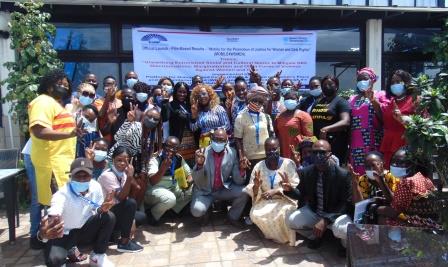MONROVIA, LIBERIA – Diverse stakeholders have called for robust collaborative actions to end all forms of negative cultural norms against women and girls in Liberia.
Speaking recently at a local hotel during the official launch of Mobile4Women, a project funded by Women’s Peace and Humanitarian Fund and Spotlight Initiative through the UN Women, the Chairperson of the National Civil Society of Liberia (NSL) cautioned stakeholders to step up efforts in the fight against gender-based violence in the country.
Mrs. Loretha Aletha Pope-Kai said gender-based violence has become a troubling menace in the country that it requires increased and uninterrupted mitigation efforts.
Mrs. Pope-Kai spoke over the weekend while attending a firm based study conducted by Platform for Dialogue and Peace (P4DP) regarding gender-based violence and marginalization of women and girls in Grand Bassa and Montserrado Counties.
She praised P4DP for the comprehensiveness of its research findings and implored state actors to ensure effective implementation of the research findings. She believed that implementing the findings of the study will help to improve the country’s justice system and thus reinforce confidence of victims and their families, thereby putting an end to society’s silence on negative culture norms.
Representing the U.N. Women Country Representative, Dr. Pear Atuhaire, technical program specialist, for U.N. Women also commended the study- ‘stressing that such research on social norms and cultural practices are parallel factors and contributing to gender base violence, marginalization and vulnerability of women and girls”.
She further noted that “the findings will make a significant improvement to a safe society for women and girls globally”. Also, remarking on behalf of H.E Urban Sjostrom, the new Sweden Ambassador to Liberia, Miss Dwede Tarpeh, said ‘evidence-based research of this nature offers multiple performance of engagement and other facts that are important in fighting GBV.
The Gender and human security program officer expressed thanks to P4DP adding that they look forward to exploring possibility in seeing how such evidence-based piece of research will help to sustain and better their own efforts.
For his part, P4DP Executive Director, James S. Shilue, said the research which culminated in a documentary provides a firsthand understanding of entrenched social and cultural norms that fostered GBV, discrimination, marginalization and other forms of violence against women and girls in Liberia.
Mr. Shilue noted that P4DP used audio mobile evidence based-quantitative and qualitative methods in conducting the study. He said the study was conducted in ten communities in both Grand Bassa and Montserrado Counties, adding “these communities also participated in the validation of the findings.”
The Executive Director further explained that the research unearthed several entrenched social and cultural and other forms of violence’s against women and girls which, among others, include narratives about masculinity and femininity, bride price increasingly becoming a form of enslavement rather a symbol of appreciation; discriminatory practice in terms of fees paid for boy and girls during both financial violence and bush school marriage during the rite to the Sande(female) society.
Mr. Shilue hoped that the findings would help halt several entrenched social and cultural and other forms of violence’s against women and girls in the country.
According to Mr. Shilue, the research impacted a total of 682 direct beneficiaries consisting of 441 women and girls, and 241 men and boys. For indirect beneficiaries, it impacted about 34,100 persons based on national statistical inference of five household dependents to a household head.
The P4DP boss asserted that capacities of 25 participants from nine beneficiary women’s rights and women led organizations were built.
The beneficiaries, according to Mr. Shilue, underwent an eight-day capacity building training in Grand Bassa and Montserrado Counties in various areas including peace building, conflict prevention, organization structure, management and operations, advocacy and awareness on key social, culture, religious and political barriers to women, accessing justice under dual legal system in Liberia.

